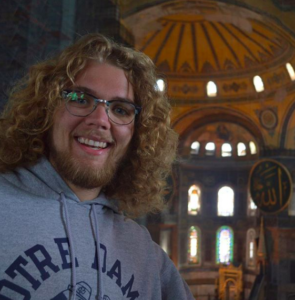Recipient Profile

E-mail: alischke@nd.edu
Language: Arabic
Location of Study: Amman, Jordan
Program of Study: Qasid Academy
Sponsors: Center for the Study of Languages and Culture; College of Arts and Letters
Blog URL: http://sites.nd.edu/sla2019/author/alischke/
Pre-departure
A brief personal bio:
I am a rising senior studying Sociology and Arabic with the intent of pursuing a PhD in Sociology. Originally hailing from North Carolina, I miss the warmth of the south but remain a proud member of Stanford Hall (The Cinderblock Palace of Love) at the University of Notre Dame in balmy South Bend, Indiana. I have a younger brother enrolled at Wake Forest University and two younger sisters in high school and elementary school, respectively. My plans for the future revolve around obtaining a PhD in Sociology and becoming part of the milieu of academia’s metaphorical ivory tower. But, as with all future plans, they are subject to change. Right now, I am spending a semester studying in Israel/Palestine and am excited to extend my Middle Eastern lifestyle for another two months in Amman, Jordan.
Why this summer language abroad opportunity is important to me:
This SLA Grant is not only an opportunity to immerse in Jordanian society and culture, but also an opportunity to gain an vital skill in communication. Communication is the greatest gift to human beings. Without language, humanity could not exist nor would it subsist. For this reason, language acquisition is one of the most significant requirements for an individual’s inclusion in the greater fabric of humanity. Language barriers (aptly named) implicate humanity with divisive attitude, exacerbating certain cultural and religious tensions. The SLA Grant, then, is important for breaking these barriers. Only through a shared language or understanding of each other, can two human beings truly know each other. Since many of my research interests in Sociology ponder the plight of Arabic speaking populations (specifically refugee and revolutionary Arab populations) achieving fluency in Arabic is vital for true, objective, scientific inquiry. Beyond its vitality in scientific inquiry, though, learning Arabic would allow me to effectively communicate with a group of people often marginalized, ostracized, and demonized in Western society. With a simple ‘marhaba’ or ‘ahlan wa sahlan’, these communities on the margin of American society could come to know the love and solidarity found in human experience. The SLA Grant I have been awarded not only provides professional and academic opportunity, but also grants access to an inventory of human experience beyond the Notre Dame bubble.
What I hope to achieve as a result of this summer study abroad experience:
During my time in Jordan, I hope to become more fluent in the Arabic language and more competent in Arab cultural practices. Through this acquisition, I hope to better structure the stream of consciousness that is my Fulbright Project Proposal regarding the effect of time on a refugee population’s attitudes toward repatriation. By experiencing Jordanian culture, politics, and institutional treatment of refugee communities, I’ll be able to narrow down the questions necessary for explicating the underlying pull and push factors which affect attitudes toward repatriation. More superficially, though, I hope to gain fluency in Arabic. I don’t expect to leave from this summer immersion with complete fluency, however, to be able to read, understand, and speak better than the average second-grade Arab is a prospect that excites me.
My specific learning goals for language and intercultural learning this summer:
1. At the end of the summer, I will be able to read any Arabic news article with relative ease.
2. At the end of the summer, I will be able to hear and piece together conversations without translating in my head. Conversation will become much more natural and I will be able to structure sentences in Arabic without first forming them in English.
3. At the end of the summer, I will have found an academic advisor in Jordan to help with formulating, specifying, and executing my Fulbright research proposal.
4. At the end of the summer, I will be able to understand the lyrics of Arabic music.
5. At the end of the summer, I will be able to write in Arabic creatively; beyond simple mechanical sentences and more toward a poetic style of the language.
6. At the end of the summer, I will have grown in fluency equivalent to two semesters of intensive Arabic study at Notre Dame.